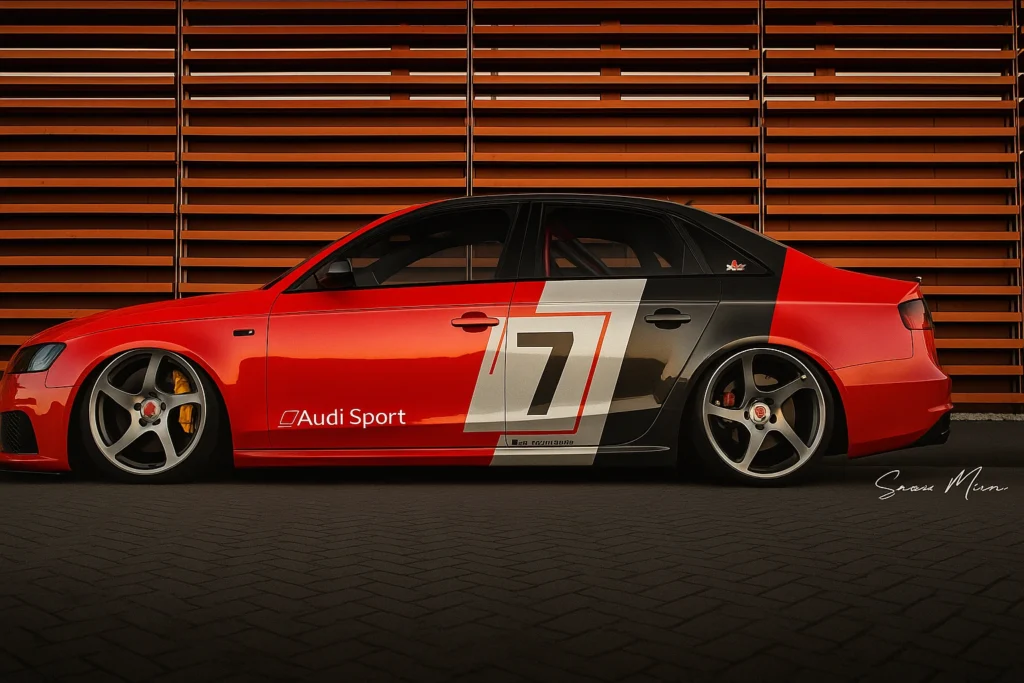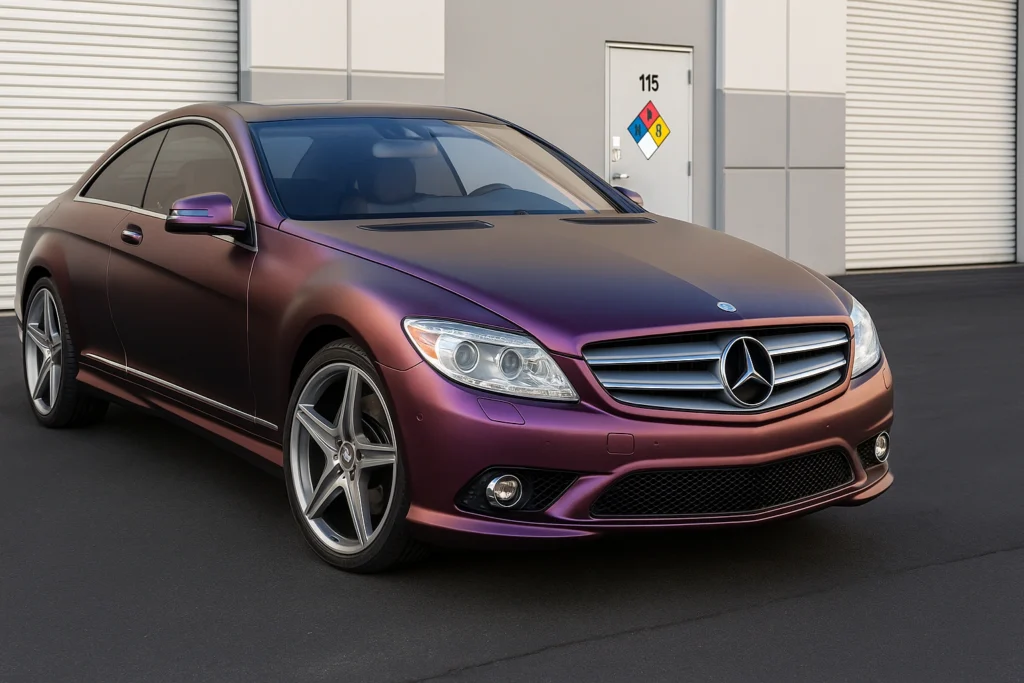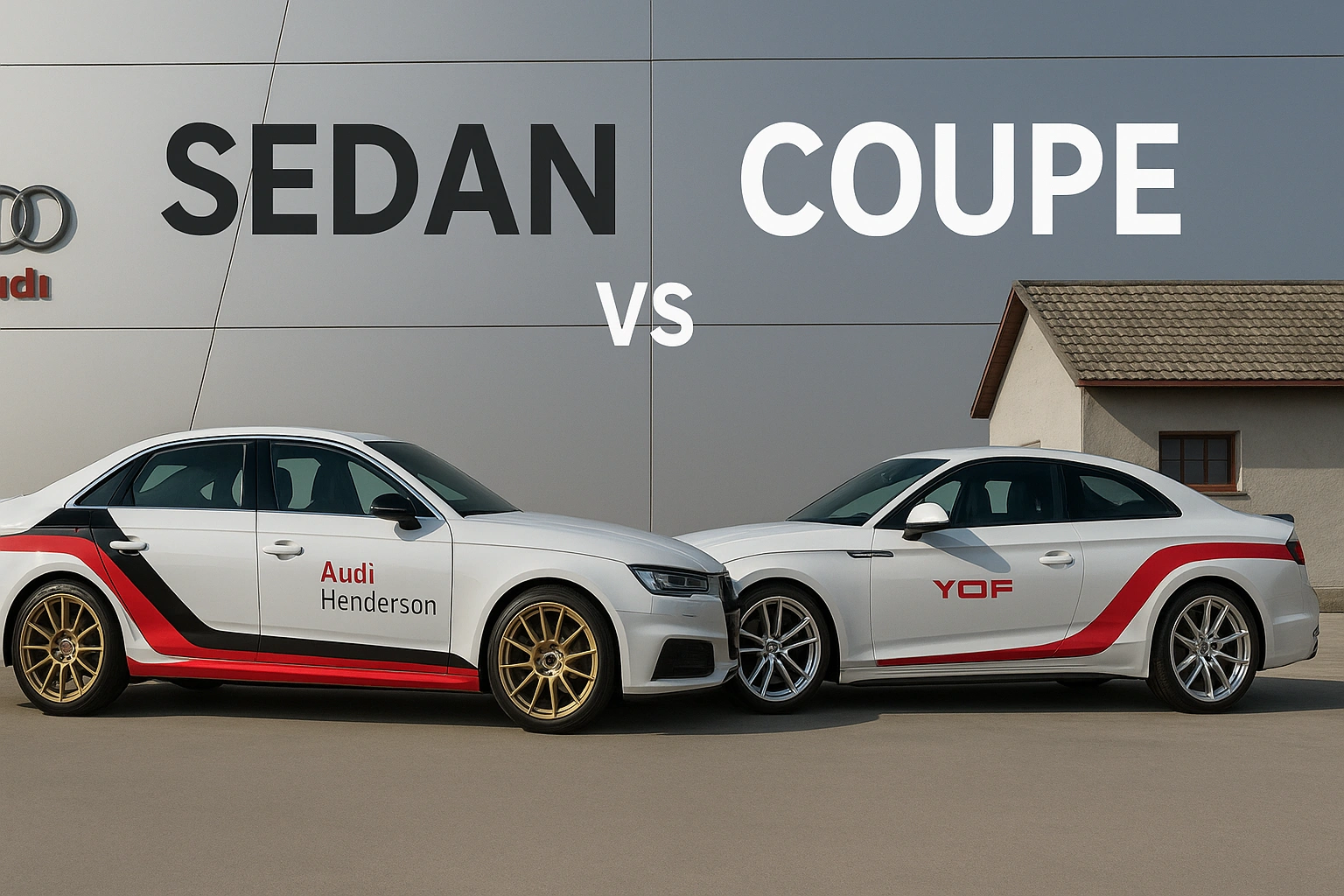Introduction
When car owners consider wrapping their vehicles, one question always surfaces: Is it easier to wrap a sedan or a coupe?
After 15 years in the automotive wrap industry, working on everything from compact commuters to luxury exotics, I’ve wrapped more cars than I can count. The truth is, the difference isn’t just about body size, it’s about panel curves, surface area, accessibility, and the car’s original design.
In this guide, I’ll break down the real differences between wrapping sedans vs coupes, including costs, durability, difficulty, and maintenance. You’ll see honest comparisons, real shop experiences from Vinyl Wrap Pro, and practical advice so you can make the smartest choice for your next wrap.
Key Takeaways
- Coupes are harder and costlier to wrap due to tighter curves and limited access.
- Sedans often take less material and time, lowering overall costs.
- Wrap durability depends more on prep work and climate than body type.
- Professional installers can mitigate coupe complexity with heat-molding techniques.
- For USA car owners, expect sedan wraps to cost 10-20% less on average.

1. Understanding the Basics: What’s a Sedan vs a Coupe?
Before comparing wrap difficulty, let’s clarify what each design entails.
A sedan typically has four doors and a longer body with a separate trunk area. Think of models like the Toyota Camry, Honda Accord, or Tesla Model S. Sedans are built for comfort, accessibility, and smooth airflow.
A coupe, by contrast, is usually a two-door car with a sportier, more compact body. Popular examples include the Ford Mustang, Chevrolet Camaro, and BMW 4 Series. Coupes often have sharper curves and lower rooflines, great for aesthetics but tricky for wrapping.
2. Why Body Shape Matters in Wrapping
Vinyl wraps behave best on flat or gently curved surfaces. The more curves, the more challenging the job becomes.
Sedans usually feature:
- Larger flat panels (doors, hood, trunk)
- Simpler bumper contours
- Easier door and roof access
Coupes, however, have:
- Aggressive curves around fenders and bumpers
- Shorter yet more complex panels
- Tight angles near taillights and mirrors
That’s why installers like those at Vinyl Wrap Pro often estimate an extra 3-4 labor hours for coupe wraps compared to a sedan of similar size.
3. Material Usage: How Much Vinyl Is Needed?
The amount of vinyl required depends on the total surface area.
- Average Sedan Wrap: 55-65 feet of vinyl
- Average Coupe Wrap: 60-70 feet of vinyl
Why does the smaller coupe use more material? Because its shape demands extra film for stretching and repositioning. Curved areas consume more wrap per panel due to overlap and trimming waste.
As a rule of thumb, coupes require 10-15% more vinyl material than sedans.
4. Cost Breakdown: Sedan vs Coupe Wrap Pricing (USA)
Let’s talk real numbers. Based on 2026 USA averages:
| Vehicle Type | Partial Wrap | Full Color Wrap | Premium Finish (Chrome, Satin, etc.) |
| Sedan | $2,000 – $3,500 | $3,500 – $5,000 | $5,000 – $7,000 |
| Coupe | $2,500 – $4,000 | $4,500 – $6,500 | $6,500 – $8,500 |
These prices come directly from Vinyl Wrap Pro’s nationwide network. Labor intensity and surface complexity are key factors.
Pro Tip: Always request a panel-by-panel quote. Some coupe wraps require partial disassembly, like removing mirrors or bumpers, to ensure a seamless look.
5. Installation Time: The Hidden Factor
Speed matters, especially if your car is your daily driver.
- Sedan wrap: 2-3 days average
- Coupe wrap: 3-5 days average
In my experience, coupes take longer not just because of curves but because of their compact interiors. Installers have less maneuvering room, which slows the process.
At Vinyl Wrap Pro, we track installation efficiency. Sedans average 22 labor hours, while coupes push closer to 30.
6. Case Study 1: Tesla Model 3 vs BMW M4 Coupe
In one of our projects, we wrapped a Tesla Model 3 sedan and a BMW M4 coupe using 3M 2080 Satin Black film.
- Tesla Model 3 (Sedan): Completed in 24 hours, 58 ft of film, flawless coverage.
- BMW M4 (Coupe): Took 31 hours, 67 ft of film, and required 3 extra pre-cut pieces for rear fenders.
Despite the M4 being smaller, the wrap cost $1,100 more due to the additional labor and materials.
Result: Sedans prove faster and more budget-friendly for full wraps.
7. Design Flexibility: Which Looks Better Wrapped?
Coupes undeniably have more visual flair. With bold contours and sporty shapes, wraps often pop more dramatically on coupes.
Sedans, however, provide a smoother canvas for branding or color transitions — ideal for business fleets or professional looks.
For example, our truck & fleet wraps often follow sedan-style body lines for maximum logo visibility.
If you’re wrapping for business or a daily driver, a sedan is easier to design around.
If it’s for show or personalization, a coupe’s dramatic lines make the wrap shine.
8. Durability: Does One Last Longer?
Surprisingly, durability has less to do with car type and more with:
- Vinyl quality
- Installation precision
- Maintenance routine
Both sedans and coupes last 5-7 years with proper upkeep.
However, the tight corners on coupes are prone to edge lifting if not post-heated correctly.
Vinyl Wrap Pro offers full coverage under their Vinyl Wrap Warranty & Guarantees (What’s Covered), protecting you from premature peeling or bubbling.
9. Case Study 2: Daily Driver vs Weekend Coupe
A client from Austin, Texas, wrapped his daily-driver Toyota Camry sedan in Matte Gray and his Chevrolet Camaro coupe in Gloss Red.
After two years:
- The Camry wrap still looked fresh after routine hand washing.
- The Camaro’s rear fender wrap began lifting due to heat expansion near the exhaust.
Lesson learned: Coupes with sporty exhaust setups or tight heat zones require ceramic overlaminates for longer protection.
10. Maintenance Tips: Keep Your Wraps Looking New
Proper maintenance makes the biggest difference in wrap longevity.
Do:
- Hand wash with pH-neutral soap
- Park under shade or use covers
- Apply wrap-safe detail sprays monthly
Don’t:
- Use pressure washers too close
- Visit automatic car washes
- Let bird droppings or tree sap sit for long
Read our full vinyl wrap maintenance guide for professional cleaning methods and product recommendations.
11. Case Study 3: Business Fleet Wraps vs Personal Coupes
Fleet clients often wrap multiple sedans for uniform branding. One corporate order included 15 Nissan Altimas, all completed within two weeks, a testament to sedan efficiency.
By contrast, individual coupe projects like custom Corvettes or Mustangs require hand-fitting and specialty films.
In short:
- Fleet Sedans → faster turnaround, consistent results
- Coupes → slower, artistic, high-cost installs
That’s why Vinyl Wrap Pro’s truck & fleet wraps remain a top choice for businesses across the USA.
12. Design and Film Choices: What Works Best?
| Finish Type | Ideal For | Notes |
| Gloss | Sedans | Clean, professional look, easy to maintain |
| Matte/Satin | Coupes | Sporty appeal, hides imperfections well |
| Chrome/Color Shift | Show Cars | High attention grabber, but harder to install |
| Printed Graphics | Fleets | Best for brand visibility |
For unique small business designs, see our food truck wrap cost & design tips.
13. Case Study 4: Learning from a Failed Coupe Wrap
A DIY enthusiast once attempted to wrap his Audi TT coupe at home using budget vinyl.
Within six months, the wrap began cracking near the headlights and lifting at door edges.
When he brought it to Vinyl Wrap Pro, we stripped the film, prepped the panels correctly, and rewrapped it with Avery Dennison Supreme Gloss White. The result: a flawless finish that still looked new after a year.
Takeaway: Coupes need precise tension control and post-heating, not ideal for beginners.

14. Vinyl Wrap FAQs (People Also Ask)
It’s easier to wrap a sedan because it has flatter panels, easier access, and requires less vinyl and labor than a coupe.
Coupes have tight curves, sharp angles, and limited space for installers, increasing time and difficulty.
On average, coupe wraps cost 10-20% more than sedan wraps due to additional labor hours.
Both last 5-7 years with proper care. Coupes might experience earlier edge wear due to heat and curves. Regular cleaning and garage parking help extend life.
Not recommended. Coupes have steep curves that demand heat stretching and precision cutting. Professional shops like Vinyl Wrap Pro ensure a bubble-free finish and warranty coverage.
Yes, but choose films with higher conformability (3M 2080, Avery Supreme). For complex curves, premium films are worth the cost.
Absolutely. Labor rates differ. East Coast shops average higher hourly costs than Midwest or Southern installers. Always compare local quotes.
Opt for partial wraps or roof/hood accent wraps. These deliver style at a lower cost. Use our Vinyl Wrap Warranty & Guarantees page to verify coverage.
Yes. Sedans are ideal for consistent branding and bulk application. Learn more in our truck & fleet wraps guide.
Final Thoughts:
So, which is easier to wrap, a sedan or a coupe?
Hands down, the sedan wins for simplicity, cost efficiency, and faster turnaround. Coupes demand more skill, time, and premium materials due to their intricate curves.
If you’re planning a custom look or full business branding, start with a sedan to stretch your budget further.
For performance enthusiasts and design purists, coupes offer unmatched visual payoff, just expect a higher investment. Ready to transform your car?
Get a free wrap quote from Vinyl Wrap Pro, trusted by USA car owners and fleets for top-tier design, durability, and precision.

